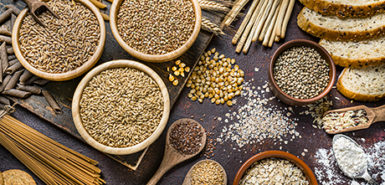
Maybe it’s the aroma.
Maybe the warmth.
Whatever the reason, a pot of soup simmering on the stove can make us feel cozy even on a chilly day.
The familiar cold-weather comfort food also can be good for our health.
Holly Dykstra, RD, a Spectrum Health dietitian, likes to get creative when she makes soup, varying her recipe to fit the ingredients on hand.
“This time of year, I love vegetarian chili,” she said. “I love to serve it with a homemade cornbread roll.”
Dykstra outlined four reasons to cook a batch of homemade soup.
1. Nutrition
“Soups can be super nutrient-dense,” Dykstra said.
“You can add tons of nutrient-dense vegetables. You can add whole grains or ancient grains, which have lots of fiber and vitamins. You can add different types of proteins like beans and chicken. And you can use all sorts of herbs and spices, which have some nutritional value and can also add flavor.”
And they can help keep you hydrated.
“If somebody is having a hard time getting fluids, soups can be a great way to do that,” Dykstra said.
“Broth can be counted towards your total daily fluid intake. Just be aware of the sodium content of broth. If you’re trying to reduce your salt intake, choose a low-sodium broth or unsalted stock for your soup. Or make a homemade stock with water and vegetable scraps.”
Soup may also be a way to improve your gut health. Making a miso soup is a good way to add fermented food to your diet. Miso paste is a probiotic that aids gut health.
2. Flavorful flavenoids
Onions and garlic—common soup flavor enhancers—are high in flavenoids. These nutrients have anti-microbial and anti-inflammatory properties and are associated with reduced risk for cancer, heart disease and neurodegenerative disorders.
A number of common soup flavorings have anti-inflammatory properties, including ginger, oregano, rosemary, thyme and turmeric.
Chili peppers are high in antioxidants, which are linked to improved eye health, reduced cancer risk and other health benefits.
Cumin seeds are antimicrobial and can serve as a digestive aid. They may help soothe an upset stomach.
3. Satisfaction
When people drink warm beverages, it really increases satiety,” Dykstra said. “Research shows that people tend to feel more full and satisfied for a longer period of time when warm or hot liquids are consumed.”
And when you feel satisfied, you are less likely to go searching for less nutritious treats after a meal.
“Satisfaction with your eating habits can really help improve the overall quality of your diet,” Dykstra said.
4. Convenience
It is easy to keep soup ingredients on hand—such as frozen vegetables, canned beans and tomatoes. And if you buy grains like rice and barley in bulk, soup can be easy on the budget.
Also, making soup is a good way to use up produce before it goes bad.
“You are reducing waste, and that’s a nice benefit, as well,” Dykstra said.
You don’t need a lot of ingredients to make soup. You only need four to five ingredients to make chicken noodle soup or a soup starring one ingredient, like tomatoes, squash, or carrots.
Once you have made a pot of soup, you can freeze it in smaller portions.
“You can have it ready to go when you need a quick meal,” she said.
 /a>
/a>
 /a>
/a>
 /a>
/a>
Thanks for your ideas and great read